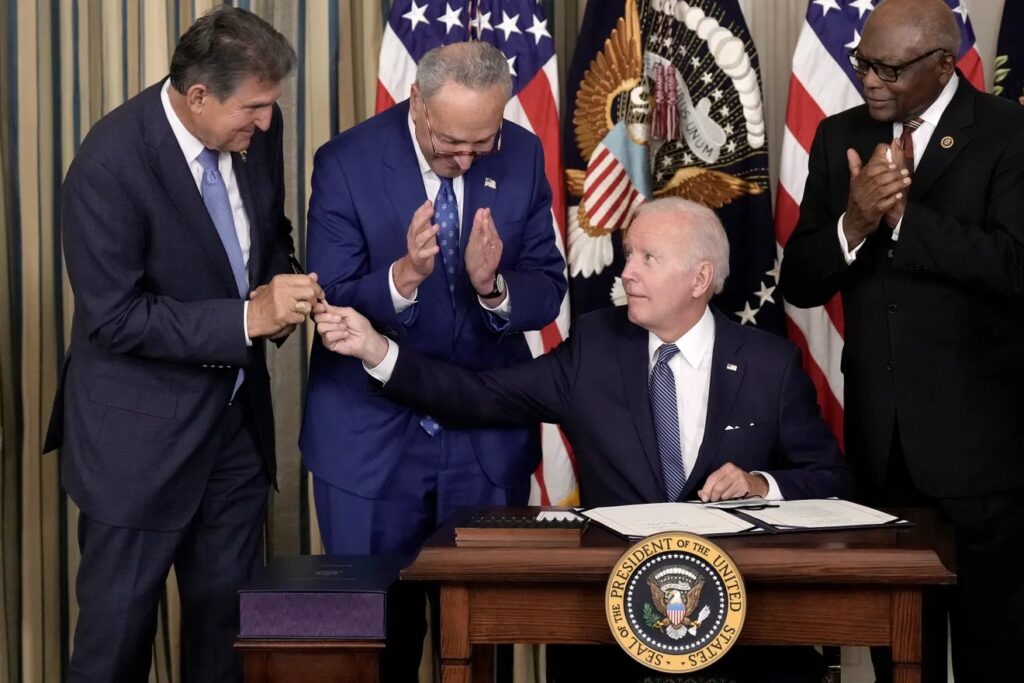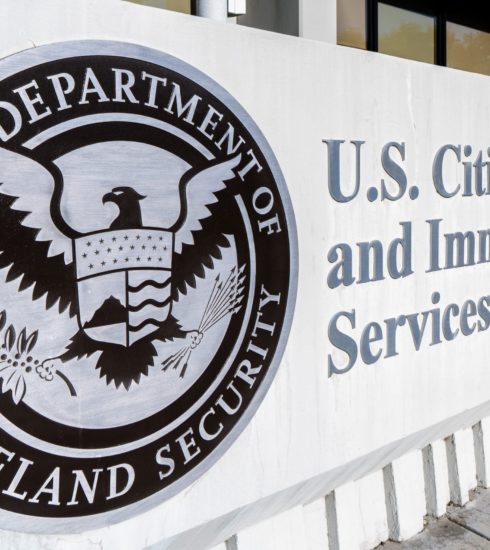-A landmark investment in clean energy, healthcare and taxation
President Joe Biden recently signed the Inflation Reduction Act (IRA) into law after it passed two party-line votes in the House (Final Vote: 220-207) and the Senate (Final Vote: 51-50) where Vice President Kamala Harris cast the tie-breaking vote.
The new law is aimed at helping to reduce consumer spending in two major categories—health care and energy—with investments offset by corporate-minimum and stock-buyback taxes, and increased funding for the IRS to pursue wealthy tax cheats.
Passing any significant climate, health-care, or tax legislation seemed impossible a month ago, frustrating and worrying Democrats, whose razor-thin Senate majority may not survive the November midterms.
The law will do a variety of things, including allowing the government to negotiate the prices of costly prescription drugs and extend subsidies for people buying their own health insurance. But the new law won’t expand free health insurance to a large swath of Americans as some are insinuating. It only extends existing subsidies for people who buy health insurance on the marketplace set up by the Affordable Care Act.
The law also contains long-awaited provisions that will allow Medicare to negotiate with pharmaceutical companies, cap the price of insulin, limit out-of-pocket drug costs for seniors, and extend tax credits that help keep millions of Americans insured.

Biden described the legislation as a “godsend” and “one of the most significant laws in our history.” It has also been lauded by many people across America. Yet, it is the law’s climate provisions that have garnered the most attention. Its historic investments in clean energy are projected to result in a 40-percent reduction in U.S. emissions (from 2005 levels) by 2030—well above the 25-percent reduction projected before the new law.
The bill includes roughly $369 billion in incentives for energy and climate-related programs, including tax rebates and credits to lower energy costs for households. It also includes tax credits, research loans, and grants to increase domestic manufacturing capacity for wind turbines, solar panels, batteries, and other essential components of clean energy production and storage. It equally has provisions for tax credits to reduce carbon emissions and programs to reduce the environmental impact of agriculture.
The bill also makes a number of changes to the corporate tax code. Though it’s not a sweeping reform (like the Tax Cuts and Jobs Act of 2017) and a last-minute effort to remove a controversial proposal on the so-called carried interest loophole, its changes will have an impact on mid-to-large-sized corporations and a measured knock-on impact on the rest of the economy.
It establishes a 15% alternative minimum tax on book income on both (a) US-based corporations with at least $1 billion in revenue over a three-year average and (b) foreign-headquartered groups with at least $100 million in revenue over a three-year average while also imposing a 1% excise tax on the fair market value of stock repurchased by publicly traded companies (with exceptions).
On the healthcare front, the bill represents one of the most significant pieces of healthcare legislation in recent years by allowing the government to negotiate drug prices and restructuring how drugs are covered under Medicare, significantly impacting drug manufacturers, pharmacy benefit managers, and health insurers.
This ultimately means the Secretary of the HHS (Dept. of Health and Human Services) can negotiate maximum fair prices for 50 drugs in Medicare Part D and 50 drugs in Medicare Part B on a phased schedule. Notably, drugs that are less than nine years (for small-molecule drugs) or 13 years (for biological products) from their U.S. Food and Drug Administration (FDA)-approval or licensure date would be held exempt from negotiation. To enforce the negotiation, the bill imposes a monetary penalty of 10 times the difference between the offered price and the maximum fair price (MFP) for all applicable units.
It also effectively delays the implementation of the Trump era so-called “rebate rule” that was implemented in November 2020 until 2023. That rule eliminated the safe harbor for Part D drugs and enforced the discounts at the point of sale.
Some economic watchers say that despite its name, the IRA is unlikely to have a large effect on inflation, at least in the short term. While the tax provisions and savings on health-care spending may help in that regard, some of this will be offset by the law’s environmental provisions, which will encourage more short-term consumer spending via tax credits and rebates. In any case, if the law’s greatest impact is not on inflation or the deficit, it is most likely to be on investments in renewable energy. And this is most definitely a step in the right direction.







